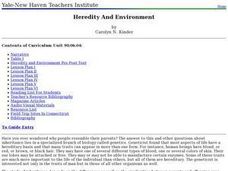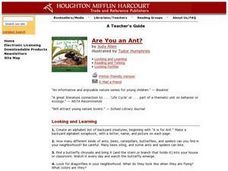Curated OER
Animals Active at Night
Young scholars identify animals that are active at night and the reasons why. They examine the features needed to be a nocturnal animal. They create a representation of one of the animals.
Curated OER
"Where is My Food?"
Students investigate the monarch's searching behavior and ability to find food. They determine whether or not a caterpillar can find food in a simple Y-shaped maze. They record and graph or chart the data from several attempts using...
Curated OER
Heredity And Environment
Students complete a pre-test on the relationship between heredity and the environment. As a class, they write down descriptions of themselves and identify which traits can be changed and not changed. In groups, they determine which...
Curated OER
Quick Concept Demonstrations
Students research the nervous system. Demonstrations on how to pick up keyed information in text is shown daily and weekly. Reviewed for content is Nerve Impulse, Polarization and Depolarization and perception. A spreadsheet will graph...
Curated OER
Nature By Numbers
Students study the concept of numbers found in the natural world. They explore the wonder and necessity of the diversity of different plants and discover that plants have numbers hidden in them everywhere. They survey where they might...
Curated OER
Biomass: The Energy of the Future
Sixth graders examine information about a variety of renewable fuels. They read key vocabulary terms, read and discuss a story handout, and conduct research on renewable fuels. Students then complete a comparison chart, and write an...
Curated OER
Plastics by the Numbers
Students investigate plastic resins and their uses. In this plastics lesson plan, students describe major plastic resins and what they are used for, they compare and contrast the properties of plastic resins and they list products that...
Curated OER
The External Anatomy of the Crayfish
Students investigate the external anatomy of a crayfish. In this arthropod lesson plan, students study the structures of the head, the body and the appendages of a crayfish. They locate specific structures present in arthropods and...
Curated OER
Blending Butterflies
Students create camouflage butterflies. In this camouflage lesson plan, students read about the different types of camouflage. Each student in the class chooses a spot in the classroom and creates a camouflaged butterfly. They hang up...
Curated OER
Can You Measure Up!
Seventh graders investigate standards of measurement and metric units using a game to show the importance of standards of measurements. In this measuring lesson plan, 7th graders are grouped together and each group represents a foreign...
Curated OER
Using a Spreadsheet to Solve Gas Law Problems
Students use a spreadsheet to solve gas law problems. In this gas laws lesson plan, students use the Express Calc program to load a spreadsheet for the gas law problems. Students compute volume, temperature, or pressure according to the...
Curated OER
Our Five Senses
Students use their five senses to describe what's in a mystery bag. In this senses lesson, students use a graphic organizer to collect words for a sensory poem.
Curated OER
An Apple a Day
Students explore the Johnny Appleseed story. In this service learning lesson plan, students sequence the life cycle of apple trees and recognize how Johnny Appleseed worked as a philanthropist.
Curated OER
It's Goin' Down; The Rain Forest
Students discover the global problem of deforestation. In this environmental instructional activity, students identify organizations on the quest to stop deforestation. Students also discover what they can do to solve this global dilemma.
Curated OER
Now You Have It, Now You Don't
Students compare shipping peanuts made from corn and made from Styrofoam. In this corn based peanuts lesson plan, students understand why to use eco-friendly materials for packing. Students participate in an experiment to compare the...
Curated OER
Are You an Ant?
Students investigate different insects in their backyard. In this insect lesson, students read the book Are You and Ant? and apply the reading to their backyards. Students create a list of animals that begin with the the letter A an make...
Curated OER
Make a Model of a Tree
Students identify the parts of a tree. In this tree biology lesson, students create a tree model using tree parts and drawing the roots. Students label each part of the tree and maintain a tree journal during this unit.
Curated OER
Friction in Our Lives
Students explore force and friction. In this force and friction lesson, students discover everyday examples of how friction helps and hinders things we do. Students create a ramp to test the speed of their car. Students use...
Curated OER
Teeshirt Printing
Students become responsible and involved citizens. In this t-shirt printing lesson plan students design and create a teeshirt with a message about citizenship and responsibility. Natural objects are used as stamps.
Curated OER
How Big is a Breath?
Students demonstrate how to use math skills to measure their lung capacity. In this human biology lesson, students use a clear plastic container, measuring cup and rubber balloons to demonstrate how the lungs work. Students estimate the...
Curated OER
Ecology
Students make connections between their daily lives and the usage of natural resources as they relate to the importance of environmental quality. In this ecology lesson, students listen to the story The Lorax by Dr. Seuss...
Curated OER
Graphics Creation and Statistical Interpretation: Relating Local Economics and the Global Environment
Students apply statistics, and graphical interpretation to economics, the environment and populations. In this statistical instructional activity students construct graphical displays and classify data.
Curated OER
Pollutants on Coral
Young scholars consider the effects of acid pollution on coral reefs. They brainstorm previous knowledge about coral reefs, examine a piece of coral and observe its reaction to acid and list ways we can prevent pollution from reaching...
Curated OER
Helping Right Whales - Right Now
For this whales worksheet, students answer eight questions referring to the right whales found in the Atlantic Ocean. Students read a map to answer three questions and five questions are multiple choice.
Other popular searches
- Major Branches of Science
- Biological Sciences Branches
- The Branches of Science
- 20 Branches of Science
- 12 Branches of Science
- Three Branches of Science
- All Branches of Science
- Earth Science Branches
- Biological Science Branches
- Science Branches

























